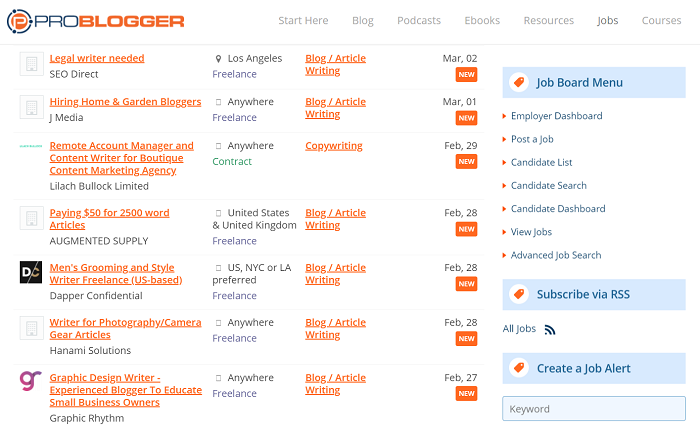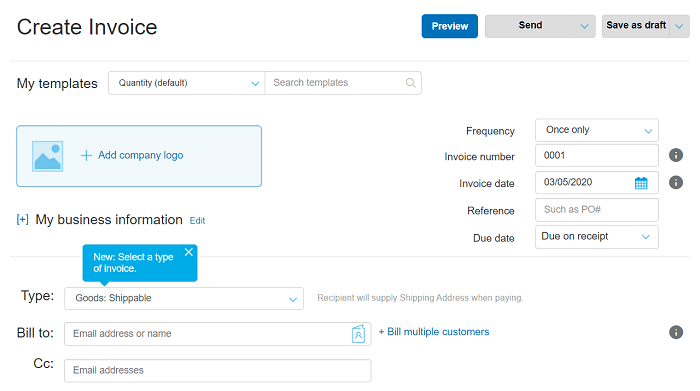What is freelance writing?
That’s the million dollar question, isn’t it?
You’ve heard all the sexy stories about the glamorous life of a freelance writer.
Working from a beach on an exotic island. Making money in your pajamas. Getting paid to write for your favorite publications.
Or maybe you’re just looking for a way to pay your bills on time (for once).
Either way, you’re excited. You may have finally discovered a path to turning the thing you love to do most — writing — into a source of income.
Sounds amazing, right?
Problem is, you still aren’t quite sure what freelance writing is, what’s involved, how you find freelance writing jobs that pay, or what you’ll need to get started.
This post will answer all these questions and more. By the time you’re finished reading, you’ll have all the info needed to decide if freelance writing is right for you.
Sound good?
We’ll start with the most basic question…

What is Freelance Writing?
Freelance writing occurs when a self-employed writer is hired to complete a writing assignment for pay.
The assignment can be any writing project — from a short product description to a 300-page eBook.
What Exactly Does a Freelance Writer Do?
Many writers eagerly jump into freelance writing thinking they’ll spend all day writing.
They don’t understand that freelance writing is a business. And there’s a lot more to this business than writing in your underwear.
A successful freelance writer can expect to spend much of their time performing the following 4 actions:
1. Marketing & Networking
Early on, the majority of your time as a freelance writer will be spent promoting your services.
The specific marketing actions you take will depend on what works best in your niche.
Some typical marketing activities include engaging on social media, writing guest posts, sending pitches to prospective clients, networking, applying to job ads, and building your online presence.
At first, you’ll be throwing things at the wall to see what sticks.
The trick is to measure the results of your marketing efforts, identify what’s working, and repeat it.
2. Writing, Proofreading, & Editing
Once you’ve negotiated the details of an assignment, the fun part begins — writing.
An easy metric to gauge the success of your freelance writing business is seeing how much time you spend on writing compared to other activities. The more you’re writing, the more money you’re making.
You’ll also spend lots of time editing your work — at least in the beginning.
Once you’re making enough to be a full-time freelance writer, you can outsource editing to a professional copywriter.

3. Professional Development
Abe Lincoln once said: “If I had 6 hours to chop down a tree, I’d spend the first 4 sharpening my axe.”
Like Abe, a freelance writer should spend a considerable amount of time sharpening their tools and skillset.
Professional development includes developing your writing skills, improving your content creation skills, keeping abreast of the latest industry developments, and more.
4. Administrative Actions
Every freelance writer’s least favorite part of the job is the administrative work.
Admin work includes sending invoices, hunting down clients to get paid, organizing taxes, filing business-related paperwork (LLC’s), and anything else involved in the day-to-day execution of your job.
What are the Different Types of Freelance Writing?
So, what types of writing are freelancers hired to do?
The short answer is anything.
Any type of writing a company wishes to outsource can be contracted to a freelance writer.
But in terms of categorization, freelance writing can be broken down by the type of audience and the type of content.
Audience Type
As a freelance writer, you’ll either be writing for a B2B audience or a B2C audience.

B2B means “business to business” — its content targets professional audiences and often involves breaking down complex topics into step-by-step processes.
Your B2B clients will include trade publications and businesses that sell to other businesses.
B2C means “business to consumer.” Its content targets regular people, and can be informative or entertaining in nature.
Clients in the B2C audience will include lifestyle publications, entertainment blogs, health blogs, and more.
Some publications target a mix of B2B and B2C. But for the benefit of your writing career, you’ll want to specialize in writing for one type of audience (at least in the beginning).
Content Type
Another way to categorize freelance writing is by the type of content you create.
Some common types of content include:
- Blogging
- Articles/Features
- Ebooks
- Newsletters
- White Papers
- Ghostwriting
- Press Releases
- Case Studies
- Copywriting
- Creative Writing
- Sales Letters
- Grant Writing
- Technical Writing
- Video Scripts
- Email Marketing
- Instructional Writing
- Speeches
- Research Reports
- Social Media Content
- Editing
- Product Descriptions
Don’t worry. No one expects you to know how to create all of this stuff.
In fact, you’d be a fool to try. Successful freelance writers specialize in creating just a few types of content.
How Do I Start Freelance Writing?
One of the many things that makes freelance writing such an attractive career option is the low barrier of entry.
In other words, you probably already have most of what you’ll need to get started. And what you don’t have can be fairly easy to obtain.
To get started as a freelance writer, you’ll need:
A Laptop, Computer, or Other Writing Device
The most critical element of any writing profession is your weapon — your writing device.
You can write using whatever device you prefer, including your laptop, phone, or tablet.

Word Processor
You can use whatever word processor you’re most comfortable with. However, it must also be compatible with your client’s preferred choice.
I recommend using Google Docs. Your writing is stored online and can be easily accessed by anyone you allow.
Writing Skills
Writing tools are useless without a skilled writer to wield them. So you’ll have to develop your craft.
In particular, you’ll need proficiency with SEO (search engine optimization), decent writing and editing skills, and an understanding of content marketing.
But don’t stop there. The best freelance writers aren’t afraid of hard work, and they’re always on the hunt for new tips, tricks, and exercises to up their writing game.
Writing Samples
A portfolio that demonstrates the quality of your writing and your ability to get results will be the most critical tool for getting clients to hire you.
You should spend a considerable amount of time developing a writing portfolio that wows potential clients. This includes collecting quality writing samples, acquiring testimonials, and collecting data (traffic stats, leads generated) on the results of your work.
How Can I Find Freelance Writing Jobs?
One day, your writing will speak for itself and you won’t need to seek out writing jobs.
Your clients will be so pleased with your work, they’ll refer you to their colleagues. Others will read your content on a competitor’s website and beat down your door to hire you.
But until that day arrives, you’ll need to slog it out with the rest of us.
There are many techniques for getting freelance writing gigs, many of which can be found here.
But in general, the various methods for getting freelance writing work fall into 3 categories:
1. Job Boards
Job boards and content mills are sites that aggregate job ads from companies looking to hire freelance writers.
Some popular job boards include Upwork, ProBlogger, LinkedIn, BloggingPro, and FreelanceWritingJobs.com.
Job boards provide a large selection of jobs you can browse through to find something that fits you. Want to write magazine articles? Find work as a ghostwriter? WordPress expert? Professional writer for small businesses?
If you can break through the noise, job boards can connect you to some pretty lucrative writing opportunities.
But therein lays the rub.
You’ll be competing against thousands of other freelance writers for the same jobs. Many jobs will ask for experience you don’t have. And it can be difficult to differentiate yourself from the competition.

2. Networking
A family member hires you to create content for their website. Another freelance writer recommends you to a former client. An editor refers you to another editor.
These are all examples of getting writing jobs through networking.
When you start out, you may not have much of a network to speak of.
But if you invest time in cultivating a solid network, it can eventually turn into a lucrative source of freelance jobs.
Having a strong network is like having an army of people working to get you jobs.
And while it’s still up to you to convince the client to hire you, a job referred through your network puts you in the strongest possible position.
Why?
Because someone else vouched for you. They put their reputation on the line in your favor.
3. Pitching
Pitching involves targeting a company or publication you want to write for, crafting an idea that you think they’ll like, then sending them an email offer.
You can either pitch an idea or pitch on spec.
When you pitch an idea, you’re sending an editor a topic, headline, and brief synopsis for an article. But you don’t actually write it until they approve.
When you pitch on spec (speculation), you write the article before the editor approves it. Then you send them a brief description of the article with a link to it.

Pitching is great because it gives you the most control. You decide who you want to write for and what you want to write.
More importantly, it gives new writers a way to cut through the noise and demonstrate their abilities to clients upfront.
The big risk with pitching is that you can spend lots of precious time crafting a pitch just to get rejected.
Do You Need a Degree to Be a Freelance Writer?
Not at all.
I have a degree in digital filmmaking that’s worth less than the paper it’s printed on. Thankfully, none of my writing clients has ever asked me about it.
At the end of the day, clients only care about one thing — whether you can do the job and deliver results.
How Much Money Do Freelance Writers Make?
This is a complex question. And the answer is: it depends.
PayScale says the average freelance writer earns between $21,000 – $110,000 per year.
So in other words, between a little and a lot… thanks PayScale.
Let’s try to break it down in a way that’s actually helpful.
The amount a freelance writer earns depends on:
- Their rate
- The size of their projects
- The amount of monthly projects they have
A freelance writer’s rate is usually calculated per word. A beginner can expect to earn between $0.10 and $0.15 per word.
So for a 2,000-word article, a beginner can expect to be paid $200 to $300.
If the freelancer has 7 recurring monthly assignments (all at 2,000 words each), they can expect to make $1,400 to $2,100 per month.
To make more money, you’ll need to:
- Increase your rate
- Get more writing projects
How Do Freelance Writers Get Paid?
You got the job.
You spent hours writing and polishing your content until it was just right.
And you submitted it to the client and they loved it.
Now comes the moment you’ve been waiting for… getting paid!
Getting paid is one of the most confusing and least popular aspects of freelance writing.
Everybody wants money. But writers tend to be ignorant and reserved about the process of actually getting it.
So let’s shed a little light on this subject.
Invoices
The first step to getting paid is sending your client an invoice.
An invoice is basically just a description of what you’re being paid for, how much you’re being paid, and how the payment is to be delivered. It’s used primarily for record keeping.
Don’t worry. Most clients will tell you how to invoice them and what information to include.

If you and the client use PayPal, you can send invoices directly through their software.
You can also use other invoicing software like Freshbooks or Harvest.
Payment
Next comes the method of payment.
How you get paid is usually entirely dependent on the client. While some clients are flexible, many have established ways of doing things.
Some clients still send paper checks, but most clients in the digital age use payment services like PayPal.
Business Account
The final payment consideration is the bank account your money goes into.
In the beginning, it’s okay to deposit money directly into a personal account.
But as business picks up, you’ll want to open a business bank account to keep your freelance money separate from your personal funds.
Separating money earned through freelancing makes things easier come tax time and is a necessity if you want the legal protections of an LLC.
Who Hires Freelance Writers (and Why)?
When people traditionally think of freelance writing, they usually think of newspapers and magazines.
After all, that’s where the big money was in the past.
And while newspapers and magazines are still a good source of paid gigs, the biggest opportunity for freelance work today lays in content marketing.
According to market research from Technavio, companies are set to increase spending on content marketing from $195 billion in 2016 to $416 billion by 2021.
The reason they’re spending more is because great content:
- Builds brand awareness
- Increases conversion rates
- Costs less than traditional advertising
And fortunately for freelance writers, most companies don’t have the staff or resources in-house to create all of this content by themselves.
Companies that recognize the value of great content are willing to pay top-dollar to freelance writers who can create it.
How Do I Pick My Freelance Writing Niche?
One of the most important career decisions a freelance writer makes is choosing a niche.
Why?
Because your niche will have a major impact on your ability to get jobs, your earning potential, and how much you enjoy your work.
You should choose a niche that:
- You enjoy writing about
- Capitalizes on your expertise
- Maximizes your earning potential

Step 1: Identify your areas of experience/expertise
What jobs have you had in the past? Are you certified in any skills or topics?
Start your niche-hunt by making a list of areas where you have experience and expertise.
These topics will be easier to write about because of your existing knowledge base.
And perhaps more importantly, it’ll be easier to convince clients to hire you if you have demonstrated experience.
Step 2: Identify topics you’re passionate about
When you’re passionate about your topic, you’ll have more fun writing about it.
More importantly, passion translates into a better product, which will please both the reader and the client.
Make a list of topics that you enjoy talking, reading, and writing about.
Step 3: Identify gaps & opportunities in the marketplace
Finally, you’ll want to validate the market potential of the topics you identified in steps 1 and 2.
Do some research to find publications related to each topic that you can write for. Look for:
- Trade publications and magazines
- Businesses with their own blogs related to the topic
You can find such publications in the Writer’s Market. Or you can try Googling variations of the phrase “[topic] + blogs”.
Topics with lots of potential clients will be more profitable and should be prioritized.
Step 4: Identify overlaps
Identify 1-2 topics that satisfy all 3 criteria: expertise, passion, and opportunity.
Congratulations, you’ve found your niche!
What Makes Freelance Writing so Attractive?
It’s not all about the money.
Writers are attracted to freelance writing for a host of different reasons, each specific to their situation.
But some of the most frequently mentioned attractions include:
Autonomy
Want to be your own boss? Who doesn’t?
As a freelance writer, you’ll have complete control over when you work. You set your own hours, and work as much or as little as you please.
You decide whether to make freelance writing your full-time job or your part-time side hustle.
Freedom
Working from home means you can say goodbye to dress codes and workplace-appropriate attire. You have carte-blanche over your entire work day.
Do you want to work in your pajamas today? So be it.
Want to punch out early? So be it.
Want to vape while you write (like I do)? Knock yourself out.
Meritocracy
The world of freelance writing is a meritocracy.
Your earning potential is directly connected to your skills and your ability to get results. Say goodbye to office politics and corporate butt-kissing.
And as we’ve already discussed, there’s no degree required and no barrier to entry. Anyone who puts in the time and sweat-equity can do the job and get clients.
Passion
For those who love writing, the biggest perk of freelance writing is the opportunity to make a living doing what they love to do. ‘Nuff said.
What’s The Most Difficult Part About Being a Freelance Writer?
Freelance writing isn’t all sunshine and roses.
The job can get tough. And not everyone can hack it.
There are a few difficulties you should be aware of and prepare to encounter if you’re planning on getting into this game.
Autonomy
The power that comes with being the boss sounds cool.
But with power comes responsibility. And some flounder under the weight of that responsibility.
The downside of autonomy is that it requires discipline and decisiveness. It’s up to you to avoid distractions. It’s up to you to make decisions about what to spend your time working on.
And if you fall off-track or fail to complete assignments, you have only yourself to blame.
Loneliness
The idea of working from home sounds incredibly attractive — until you actually do it. Every… single… day.
It’s easy to take the social nature of an office setting for granted. It’s easy to assume you can handle spending whole days by yourself.
But the reality of it makes some feel lonely and stir-crazy.

Lack Of Stability
Say goodbye to steady weekly paychecks.
With freelance writing, not only will your earnings vary depending upon your workload, but you can often go weeks without getting paid.
Also, clients can drop you out of the blue, leaving you scrambling to fill the gap.
Lots Of Research & Learning
Many assignments will require you to research subjects you know little to nothing about.
This can be good or bad depending upon how much you enjoy learning new things.
I happen to love exploring unfamiliar subjects. And to succeed as a freelance blogger or writer, you should too.
Still, the learning curve can add hours to the time you spend on a project. And time spent researching is time not spent completing new projects and getting paid.
So, What is Freelance Writing? It’s a Way to Get Paid to Do What You Love.
Remember when you first clicked on this post?
You had no idea what freelance writing was. No clue what skills were involved. And no idea how to get started.
Now, all of your initial questions have been answered.
And while you still have much to learn, you have all the info you need to make a decision and get started.
So, it’s time to decide.
Do you think you can hack it as a freelance writer?
Do you want to turn your passion for words into a lucrative career?
Are you ready to stop fantasizing about your dream life and start building it?
If so, then it’s time to take the next step.
Check out our article on “How To Become A Freelance Writer, Starting From Scratch“, and begin your journey now!
The post What is Freelance Writing? (+ Answers to All Your Questions) appeared first on Smart Blogger.
from What is Freelance Writing? (+ Answers to All Your Questions)
No comments:
Post a Comment